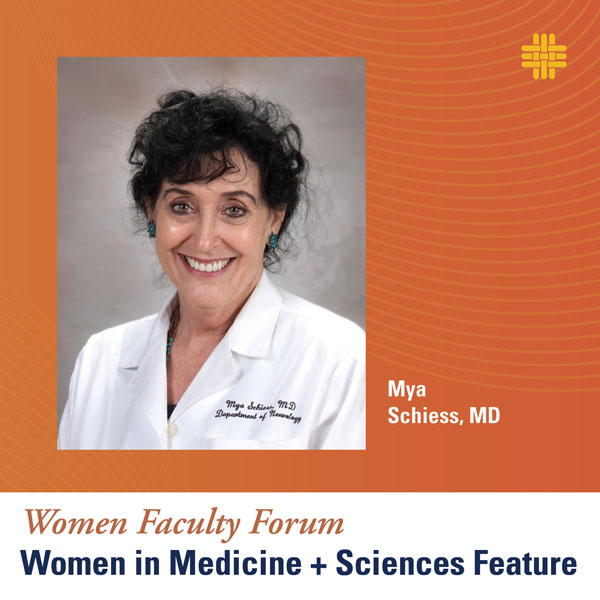Women in Medicine & Sciences Feature: Mya Schiess, MD

Each month, the Women Faculty Forum presents its Women in Medicine and Sciences Feature, highlighting the women faculty at McGovern Medical School who are leaders in medicine, research, and education.
This month’s feature is Mya Schiess, MD, professor and Adrian Blood Distinguished Chair in the Department of Neurology.
What is your background? When did you join UTHealth Houston?
I am a middle child with five siblings, raised mainly in a semi-rural area of New Mexico, and the first in my family to be a medical doctor. Fortunately, I went to an excellent public high school, which fostered my curiosity about the world, philosophy, science, and the arts.
I obtained my undergraduate degree from the University of California at Berkeley with a double major in experimental psychology and physiology. I received my medical degree at the University of New Mexico Medical School, where I was inspired in summer research programs and by the sponsorship of clinician-scientists to pursue a career in neurology.
After earning a (Career Development) K Award on the electrophysiology of sexual dimorphism of the amygdala in my senior neurology residency year at UT Southwestern and working as a fellow/faculty in pharmacology/electrophysiology and neurology at UT Medical Branch in Galveston, Texas, I joined The University of Texas Health Science Center at Houston in 1999, recruited by Dr. James Ferrendelli as an assistant professor in neurology.
What inspired you to pursue a career in science and medicine?
Becoming a medical doctor was not my initial goal as an undergraduate. However, I was always intrigued by the concept of the human mind, issues surrounding the definition of consciousness, free will, and “mind over matter.” After volunteering at the Napa State Psychiatric Institution in Northern California at UC Berkeley, I realized that to understand and then be a neurological/mental health provider and ultimately help manage illness, I needed to pursue science through a medical degree.
What are your current clinical and/or research interests?
As the division chief of UTMOVE, the Movement Disorders Clinical and Fellowship Programs, I am focused on providing the highest quality of comprehensive care to our patient population with efforts in community outreach to reduce the disparity of care and increase minority participation in clinical research and the highest quality of training to our fellows.
My translational research is focused on restorative stem cell therapeutics. Our lab is the first in the nation to get an IND with FDA approval for the use of “Allogeneic bone marrow-derived mesenchymal stem cells as a disease-modifying therapy in Parkinson’s disease,” completing a phase 1 trial showing safety in 2019 and recently a phase 2 efficacy trial still in analysis.
In collaboration with other UTHealth scientists from numerous departments, we are identifying biomarkers of disease progression in Parkinson’s and related neurodegenerative diseases, explicitly identifying molecular, imaging, and clinical markers of phenoconversion in the prodromal stages of Parkinsonism; identifying the mechanisms of fecal microbiome transplants in restoring gut and brain health in Parkinson’s disease; and identifying changes in functional and structural connectivity after deep brain stimulation, targeting the dentato-rubro-thalamic track for essential tremor states.
Who are your role models?
My mother was always my role model and support system throughout my life. She taught me a love for reading, being informed, and the meaning of kindness and compassion. Professionally, I have had numerous mentors including Roger Rosenberg, the former chair of neurology at UT Southwestern, and James Ferrendelli who was the first person in leadership to ask me what my vision was. Then as he stated, “he got out of my way.”
What do you enjoy most about working at UTHealth Houston?
I enjoy working and collaborating with the exceptional clinicians and scientists at UTHealth Houston. Our amazing clinical, research, and teaching faculty and staff have created a supportive work environment, specifically at UTPB- UTMOVE Movement Disorders clinic, a comprehensive culture of care that extends to our patients and colleagues and inspires our trainees and learners.
How do you think UTHealth Houston can further support female faculty?
Promote more women into leadership roles and provide mentorship early in their careers.
Promote equity in the provision of resources and in highlighting women faculty achievements.